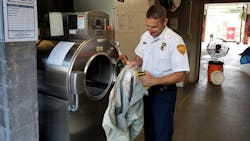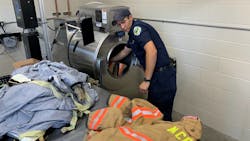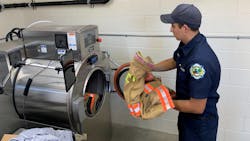Industry Expert Blog: Support Your Firehouse with Expert PPE Cleaning
Mutual Aid.
In the firefighting world, those two words are more than just part of a process; they represent a family, a bond, a promise to assist when the challenge is greater than one department can manage safely. When things get heavy, it’s good to know you’re never alone.
Over the last 20-plus years we have learned so much about the cancer risks for firefighters. We have worked together to understand more about the harmful carcinogens that lurk in bunker gear, and united in changing the culture of pride around “seasoned” gear. Progress has been made, but many departments across the country continue to seek further guidance on keeping firefighters safe and meeting NFPA 1851 guidelines for maintaining bunker gear.
NFPA 1851 went from a recommendation of cleaning once a year, to cleaning gear whenever it is soiled or contaminated driving the need for a more readily available cleaning option since sending gear out or buying a second set of gear for firefighters may not be an option financially. The best solution may be investing in laundry in-house.
The answer is as simple as two words – mutual aid. When you’re in a fight and require additional resources or those with more specialized knowledge, make the call.
A starting point
Addressing NFPA 1851 is more than just washing and drying – the technical fibers that make up turnout gear should tell you that. But rest easy, you won’t need to become a laundry expert; you’ll just need to focus your mutual aid call on a partner who is an expert and can provide everything necessary to keep staff safe. A key component to that being training, but we’ll get to that a bit later.
The first step in your approach should be focused on connecting with peers. How are they meeting their laundry needs? What equipment and systems are they using? Get the good, bad, and ugly. You wouldn’t buy a piece of apparatus without doing a bit of research and engaging peers. Along with this deep dive, ask about the distributor they worked with in providing the equipment – after-sales service will be important.
Do your own research on manufacturers. We can all agree that the fire industry has unique requirements. It’s important to identify a partner who is truly committed to the fire industry. So, what does that look like? It starts with installed equipment. Remember that reaching out to peers direction above? Is the manufacturer’s laundry equipment installed in many firehouses and is it performing well for departments?
Install base, however, is only part of the story. Look for a partner truly invested in firefighting solutions through active involvement with NFPA, work with outside organizations and agencies to devise and prove out the most effective cleaning solutions, partnerships with Independent Service Providers, and additional services specific to the industry. The best partners may even offer tools to assist in applying for grants.
Bottom line: The firehouse is a busy environment. Chiefs, safety officers and those in charge of purchasing want to do their best to streamline things by working with one vendor who can assist with all facets of laundry.
Equipment
We all know that the firehouse is a rough environment. You’ll want industrial equipment up for the task. This is not the time to look at home laundry washers and dryers. Save those machines for your station gear. PPE is heavy, made up of highly technical fabrics and metal buckles…anything short of an industrial washer-extractor is only going to be a temporary fix, and may actually harm the integrity of your gear.
Things to consider are heavy-duty, welded frames, oversized shafts and bearings, and superior out-of-balance tolerance. Washer-extractors that offer a spray rinse feature can be extremely useful in cleaning shells. Consider the difference between taking a shower and taking a bath. In a conventional bath-style rinse, gear continues to sit among soil and residual chemicals. By contrast, a shower or spray rinse sends that soil and chemistry down the drain for a much more effective rinse. Starting a cycle with a pre-rinse step with the spray rinse can be a major tool in removing those unhealthy chemicals from gear before the wash cycle even starts.
Simple, easy-to-use controls are another important consideration. Again, the firehouse is busy and anything that slows down processes is not an option. Simple controls, ones that use real words on a control display, can help tremendously and remove uncertainty. If the cycles are listed as “PPE shells” and “PPE liners” you remove all ambiguity.
Flexibility in controls is equally important to address any future changes to NFPA 1851 guidelines and adopt a tailored approach to deliver the best care for gear. Pre-programmed cycles help take user error out of the equation by keeping cycles in compliance with NFPA 1851. For instance, current standards call for water temperature not to exceed 105 degrees and a max extract G-Force of 100.
On the drying side, forget tumble dryers. While they are okay for station wear and truck towels, the tumble action is especially hard on reflective strips and technical fibers and should be avoided for drying PPE. Instead, look for drying cabinets that blow air inside and around gear, and be mindful of temperatures in accordance with gear manufacturer recommendations.
Simplify with technology
Clean gear is just part of the challenge of NFPA 1851. The other half is documentation. This is where embracing technology can encourage acceptance in the department and further streamline data collection and review.
A truly committed partner should have a seamless system that networks with the laundry equipment. Much like equipment controls, simplicity rules the day. Look for a collection system that can gather data with a simple scan of gear barcodes and a couple button pushes. Cloud-based systems simplify collection further for departments with multiple houses, enabling staff at headquarters to review data and compliance.
Training is paramount
The final component to a total solution partner is training. As with anything, process breakdowns are the direct result of a lack of training. A full solution partner will offer a variety of training tools to help departments become proficient in best practices for gear cleaning.
It’s important to have at least one member of the department certified through an Independent Service Provider. While many laundry equipment companies can provide equipment, training and advanced certification are seldom part of their range of value-added services. So, look for one that can deliver this important element, ideally in an online, easy-to-access platform.
Final thoughts
Firefighters face danger each and every day; they shouldn’t have to fear that the very gear that is there to protect them could also be a threat to their lives. Adopting a thorough and coordinated response to meeting NFPA 1851 guidelines is critical to keeping them safe. This is where calling for mutual aid from a skilled laundry expert can take the pressure off department leadership.
The key is working with not just an expert in laundry, but a partner highly experienced in the unique requirements of a firehouse laundry. Their total solution should also offer far more than just equipment; it should include systems and training – a one-stop shop.
With the right equipment, processes and training, staff can feel confident their PPE is cleaned and maintained at the highest level. That’s the peace of mind that comes from mutual aid that has your six.








